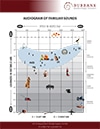If you have a child who is hearing impaired, we are here to help. In addition to our services, there are many resources for education and support that we can can connect you with.
Sign language is a complex language that uses signs made by moving the hands combined with facial expressions and postures of the body. American Sign Language (ASL) is the primary language for most North Americans who are deaf and is another communication option for those who are hearing impaired. There is no universal sign language and other countries or regions have their own version. If you are interested in learning ASL, visit the American Sign Language page at the National Institute on Deafness and Other Communication disorders.
Auditory-verbal therapy (AVT) is a way to teach deaf children to listen, process verbal language and speak using their residual hearing and hearing devices. The goal of AVT is to provide deaf and hard-of-hearing children with the tools they need to learn in a traditional school environment and be more independent. If you are interested in AVT for your child, Hearing Loss Association of America has a list of resources for California that you can contact for more information. Listening and Communication Enhancement (LACE) is also a great resource for learning to hear better.
There are local therapy programs that may help your hearing impaired child. Speech and language pathologists specialize in speech and language therapy. They can be a great help to hearing impaired children as well as children with disorders that affect speech and who are learning to communicate with others. Ruth Horowitz is a local speech pathologist who works with children using auditory verbal therapy. Communications Matters are CCS paneled speech pathologists who work with children experiencing speech, language and social communication challenges. If you are in need of a preschool for your hearing impaired or speech challenged child, Dickinson C Ross Preschool offers a communication-rich curriculum.
Pediatric speech delay is when a child’s speech development is significantly below the norm for an average child of the same age. Speech delay is concerning because it is often accompanied by other developmental problems and can significantly impact the personal, social and academic parts of their life. Delays can be caused by various conditions and disorders such as hearing loss, autism or receptive aphasia. If you would like to learn more, visit the American Speech-Language-Hearing Association’s webpage on speech delay.
The Ling Six Sound Test is a simple speech and hearing test that can be used with hearing aids, cochlear implants or no amplification at all to assess communication abilities. Utilizing the phonemes [m], [ah], [oo], [ee], [sh] and [s] to encompass low, middle and high frequencies, the test is a low tech accurate identification tool. It is an important part of testing for hearing loss in children, a child can be asked to clap in response to hearing the sounds presented, or to repeat the sound made by the clinician. The child’s response to the sounds can be a good indication of a possible hearing loss.
If you are interested in learning more about the Ling Six Sound Test, contact us today. The results of a hearing test will often be displayed on an Acoustic Audiogram, which is used to indicate sounds an individual with hearing loss may struggle to hear in their daily activities. Click on the following to view an example of an Acoustic Audiogram.
Autism and autism spectrum disorder are both used to describe a group of complex disorders of brain development. These disorders are marked in varying degrees by difficulties in social interaction, verbal and nonverbal communication, and repetitive behavior. Each case of autism is unique and can range from high functioning to significantly disabled. While there are speech problems associated with autism, Asperger syndrome is a high functioning autism spectrum disorder. This syndrome typically doesn’t have speech problems, but the individual may overspeak and have one-sided conversations. If you have a child with autism or Asperger syndrome and need resources for communicating with them, there are many resources such as Autism Speaks webpages on autism and Asperger syndrome.
If you have questions about resources for your child and family, please contact our office at (818) 859-7730 to speak with one of our team members.

